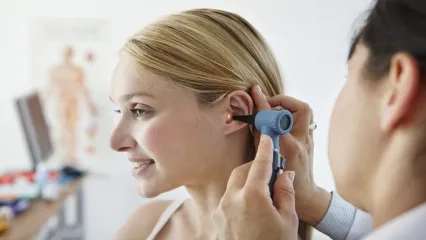Alo Yeditepe
Alo Yeditepe
Causes and Treatment of External Ear Inflammation
Although external ear canal infections generally increase in the summer due to more intensive use of the pool and the sea, it is actually a problem that can occur at any time. Ear, Nose and Throat Diseases Specialist Op. Dr. Meltem Bozacı KILIÇOĞLU pointed out that especially in people with low immunity, external ear canal infection can spread to the ear bone, surrounding soft tissues and neck, causing more widespread infection. She explained that cotton ear swabs should never be used, especially to relieve itching caused by infection.
External ear canal infections are an important problem that affects the quality of life of both children and adults, especially with the itching and pain it causes. Moreover, Yeditepe University Koşuyolu Hospital Ear, Nose and Throat Diseases Specialist Opr points out that cotton buds or nails, which are commonly used to relieve itching, may cause the infection to progress. Dr. Meltem Bozacı KILIÇOĞLU said, “Contrary to popular belief, external ear canal infections are not a problem seen only in the summer months. It occurs in all seasons and at all ages. "Especially people who are in the risk group and have had this infection before should take the necessary precautions," she said.
What is External Otisis?
“External otitis media is an acute infection in the ear canal, usually caused by bacteria. The skin in the external auditory canal may become edematous and the patient may complain of itching, pain and fullness in the ear. An external ear canal infection is usually caused by the bacteria 'Pseudomonas aeruginosa'. "Since the problem occurs at all ages, it is a situation that concerns the whole society."
What are the symptoms of External Otisis?
Underlining that external ear canal infections are a problem that occurs at all ages, our expert explained why the problem is so important:
“If the infection continues and progresses, it may cause intense pain in the ear. This pain increases especially when chewing or moving the head. If conditions such as swelling or blockage occur, it may cause temporary hearing loss or more serious ear problems in the patient. Another important aspect of the problem is that it can be repeated. There is a risk of recurrence, especially if exposure to moisture and water, which are risk factors for infection, continues or if hygiene conditions cannot be maintained. Therefore, it requires timely follow-up and treatment.”
Pointing out that the infection can be confused with cartilage infection called Perichondritis, some eczema-like skin diseases and chronic middle ear infections due to ear pain and especially itching, the ENT Specialist explained the importance of correct diagnosis and timely treatment as follows: “Increased ear size as a result of an untreated external ear canal infection Pain, swelling in the external ear canal and ear discharge may occur. If this infection is not treated in time, it can spread to the soft tissues, face and neck. The disease, which begins as a superficial infection, especially in patients with suppressed immune systems, paves the way for its spread to the head and neck regions due to the intense lymphatic system drainage in this region. “
What Causes External Otisis?
Saying that it is a common and incorrect information that external ear canal infections only occur in the summer months, our expert said, “The pH of the external ear canal is normally acidic, but when too much water leaks into the ear, it shifts towards basic (alkaline) pH as the environment becomes more humid. In this case, it creates a predisposition to infections. When the patient encounters this bacterial or fungal agent when entering the sea or pool, the patient's complaints begin to occur more frequently. Therefore, after water sports and swimming, the external ear canal will be more moist than normal, which is among the factors that predispose to the development of infection. For this reason, it should not be forgotten that although the intensity is in the summer period, it can occur in any season.”
What are the Risk Factors for External Otisis?
Our expert explains that although it is often known as swimmer's ear, one of the important reasons is the disappearance of the protective oil layer of the secreting glands in the external ear canal. "In high humidity and hot environments, the risk increases as the protective barrier feature of the external ear canal skin and ear secretion disappears. It often starts with itching. Damage to the skin occurs when cotton buds or nails are inserted into the ear for relief. This creates a more comfortable environment for bacteria to grow on the skin.”
Who is at Risk for External Otisis?
Stating that especially people who have previously had an external ear canal infection are at risk, the ENT Specialist also drew attention to people with low immunity and said: “Complaints may recur, especially after swimming or showering. Since the risk of infection is higher in people with weak immune systems, especially those with diabetes, chemotherapy or radiotherapy, and HIV + patients with a persistent history of external ear canal infection, they should be examined by an ENT specialist. Because in these patients, external ear canal infection may spread to the ear bone, surrounding soft tissues and neck, causing a more widespread infection.”
How to Treat External Otisis?
“There are four basic principles of treatment for external ear canal infection. "Frequent and meticulous cleaning, starting appropriate antibiotics, treatment of inflammation and pain are the recommendations to prevent the development of future infections," said our expert, and continued: "Seeing the patient at intervals at every stage of the infection and cleaning the external ear canal will be as effective as the ear drops the patient will use. In the phase where there is no purulent discharge, aluminum acetate drops will prevent the growth of bacteria and fungi. Since the infection is often caused by 'Pseudomonas aeruginosa', it is recommended to start antibiotic drops to cover this agent. Cortisone ear drops may also be added to the treatment. External ear canal infection does not go away on its own. He/she should definitely see an ENT doctor and start treatment. Since each patient's stage of infection is different, drops and antibiotic treatment should not be started without taking the recommendations that are good for someone else's treatment and under the supervision of a doctor.
What are the Ways to Prevent External Otisis?
ENT Diseases Specialist Op. Dr. Meltem Bozacı KILIÇOĞLU lists the precautions to be taken to protect against infection as follows:
“Vaseline cotton should be used to prevent water from entering the ear while swimming. Particular care should be taken to ensure that the swimming pool or sea water is clean. Once the ear is wet, it should be dried gently with soft cotton or a towel. "The ear should not be scratched and ear cotton or other foreign objects should not be inserted into the ear."
About
Faculty and Year of Graduation:
Çanakkale Onsekiz Mart University Medical Faculty 2013
Alo Yeditepe




